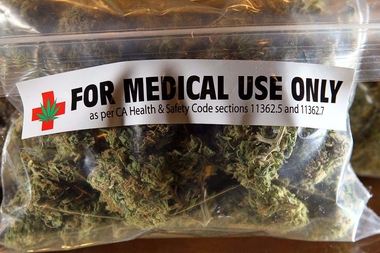Patients, families say medical marijuana in Missouri will be life-changing

Missouri voters easily passed an amendment Tuesday legalizing medical marijuana.
Amendment 2 will allow doctors to recommend the drug for the following conditions and their side effects:
-Cancer -Epilepsy -Glaucoma -Migraines unresponsive to other treatment -Chronic medical conditions that cause severe pain/muscle spasms, such as multiple sclerosis, Parkinson's disease and Tourette's syndrome -Psychiatric disorders like PTSD -HIV and AIDS -Any chronic condition normally treated with a prescription medication that could lead to dependence -Other chronic, debilitating illnesses like hepatitis C, Crohn's disease and ALS
41 Action News spoke with two patients who stand to benefit from Amendment 2 passing.
The Patient Impact
Avery Lango is like most two-year-olds. The feisty blonde toddler loves watching cartoons and spending time with her siblings.
But there's something else she has to deal with every day.
"On a typical day, she has anywhere from 20 to 100 small absent seizures," her mom, Sarah Lango, said.
Every couple months Avery has more severe seizures that last anywhere from 15 minutes to three hours. It's a catastrophic form of epilepsy called Dravet Syndrome.
The condition doesn't respond well to typical treatment options, and the medications available are less than ideal.
"They're offering her a lot of harmful, harmful side effects. They're very addictive. They're very hard on her development and her cognitive abilities," Lango said.
Through research and stories from other families, the Langos learned medical marijuana products were helping kids like Avery have fewer seizures or stopping them once they started.
That's why the family got involved with New Approach Missouri, the campaign for Amendment 2.
"All of our apples were in one basket. We didn't have a plan B," Lango said.
She wasn't alone.
"So many people are interested in the fact that a retired lieutenant colonel knows so much about cannabis," said Todd Scattini, who served in the Army for 27 years.
Scattini began researching the medical benefits of marijuana while he was serving in Afghanistan.
"I saw immediate medical applications in terms of treating some of our veterans who have chronic pain and opioid dependency, symptoms of post-traumatic stress, which many of my friends have suffered with," he said
Scattini owns a company called Harvest 360, which creates research platforms and studies patient experiences in states where medical marijuana is available.
He also hopes to obtain an identification card for his own treatment.
The Lango family is relieved they won't have to move away from friends and family to get help for Avery.
"Just a sigh of relief to know that we can stay home, we can stay here in Missouri, and she can get the medical treatment option she deserves," Sarah Lango said.
What Happens Next
Amendment 2 goes into effect on December 6. The Department of Health and Senior Services will oversee medical marijuana. Under the law they must make applications for patient ID cards and for cultivation/manufacturing facilities available by the beginning of June. The amendment also stipulates that all medical marijuana must be grown in the state.
By Cat Reid.The-CNN-Wire™ & © 2018 Cable News Network, Inc., a Time Warner Company. All rights reserved.
The Gayly. 11/8/2018 @ 12:44 p.m. CST.





